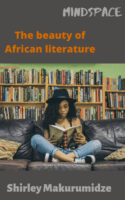For as long as I can recall, I have always been an avid reader. Books have brought forth the companionship that I desperately sought but never found in anyone.
When I was younger, I didn’t read books that had characters that I could relate to. By that, I mean black characters who were bred on the beautiful African continent. I read books by Danielle Steel, John Grisham and J.K. Rowling. All the characters in the books I read were white. It made me wonder whether black people had a place in literature.
African literature was not as widely acclaimed as Western literature. I always pondered why Africans found it difficult to find African literature in Africa. Was it because Africans were too lazy to write books?
It was not until my late teens that I was exposed to African literature. When I first came across my first African book, it was hidden on shelf behind huge European books with beautiful covers that reeled a person in from first glance. The African book looked so insignificant in the midst of the fancy European books. It didn’t have a beautiful cover, in fact it had no cover at all. When I opened the first page, half of the pages flew across the floor. Despite this unpleasant situation, something within me told me that this was a story worthy of reading. ‘Nervous Conditions’ was its name.
Shortly after I arrived home from the library, even before I ate my lunch, I jumped on my bed and opened the torn up book. The first line hit me with an intensity that I never thought possible. “I was not sorry when my brother died.” It drew me closer to the character who said those words. It also made me close the book for a while so I could reflect on those words. I wanted to figure out what had happened that drove this girl to utter such words. I could never imagine death taking away my only brother. As I read further, I became aware of the many circumstances that shaped the characters’ Nervous Conditions. I recognised these circumstances because they also shaped my Nervous Conditions. She had fought tooth and nail to get her education. I recalled how hard it had been for me to get into university and how hard I work to fund my studies.
Nervous Conditions recognised my struggles and gave me a sense of belonging. It forced me to question the world and be ready to face the answers. Its portrayal of patriarchy, identity, and race awakened me from my stupor. It blew up my little bubble of what I called tranquillity. I became aware of the spirituality in African literature. Because what I experienced was like a spiritual awakening.
There is something special in every book, Western literature is no exception. Western literature broadened my horizons and made me think of a life away from my Nervous Conditions. It dared me to dream that I could be greater. Whenever I read a line from Danielle Steel’s Wanderlust, I was transported to a world of endless possibilities. While Western literature made me forget about my Nervous Conditions, African literature made me think of them critically and forced me to embrace them. It reminded me that there was no shame in being poor and black. That I didn’t need to go to Europe to feel a sense of accomplishment. Africa could be my dream come true.
I have stopped running away from my Nervous Conditions.
The first African book I read made me go on a quest for more African books. I was then exposed to books by great writers like Chinua Achebe, Chimamanda Ngozi Adichie, NoViolet Bulawayo, and many more. I marvelled at their work. They awakened the writer in me. My sole purpose is to follow in their steps and let the world know about the African experience. I might not be able to tell stories with as much authenticity, but I will tell them nonetheless.
My reason for writing this account is to encourage many people, especially the young, to read as many books as possible. The most valuable lessons are taught in books. Read anything and everything because from what I know, all books have a lesson to teach, and offer an experience of a life time.
African literature liberated me.
***
Read about why representation in the media matters here.
Tell us: What is your favourite piece of African literature? What impact has it had on you?



